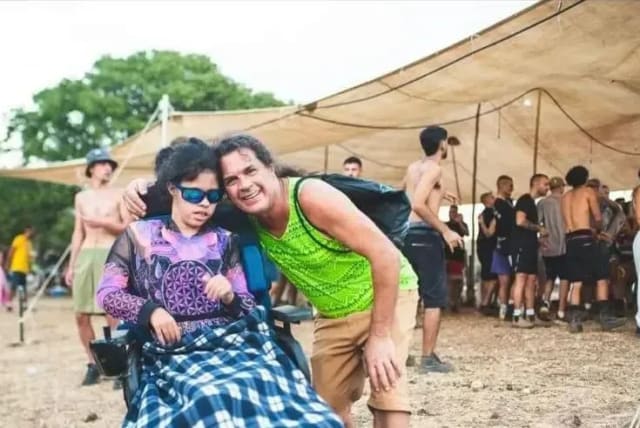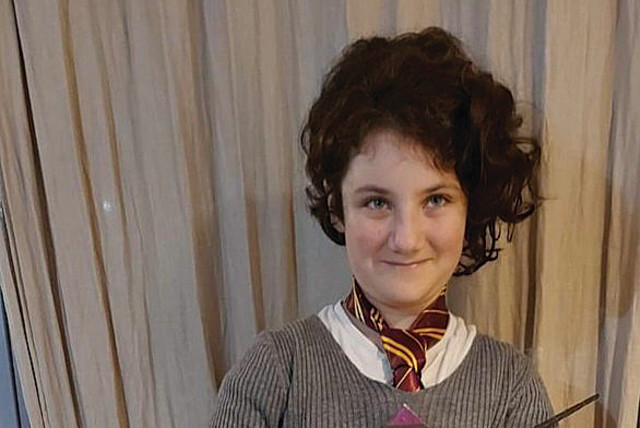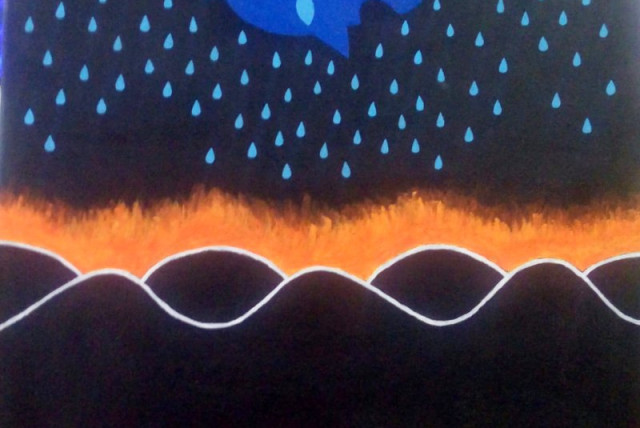Israeli special needs community struggles to cope with war

Faced with the trauma of war, children and adults with cognitive, developmental and physical disabilities are particularly vulnerable to paralyzing fear, trauma and anxiety.
The Israeli special needs community has been devastated by the loss of several of its own during the Hamas massacre on October 7, while the trauma and disruptions of the war cause on-going hardships, both emotional and practical. Israelis with special needs and those who love them are struggling to find ways to cope.
When 13-year-old Noya Dan, who was on the autism spectrum, disappeared along with her 79-year-old grandmother from Kibbutz Nir Oz, they were presumed to have been kidnapped to Gaza by Hamas.
Those who understood the difficulties facing an autistic person in the captivity of murderous terrorists held their breath, hoping against hope that somehow she would be returned unharmed.
Noya loved Harry Potter, and friends and family posted a picture of her dressed as a Hogwarts student, carrying a wand and a copy of a Harry Potter book in Hebrew. Her shy but proud smile and the meticulously put together outfit and photo tell the story: This was a very sweet, intelligent girl from a family who raised her with love and pride, who helped her embrace her passions.
The author of the Harry Potter series, J. K. Rowling, saw the photo and was moved, reposting the photo on X (formerly Twitter) with the message: “Kidnapping children is despicable and wholly unjustifiable. For obvious reasons, this picture has hit home with me. May Noya and all hostages taken by Hamas be returned soon, safely, to their families.” But there was no wizardry that could save Noya and her grandmother, whose dead bodies were identified on October 18.
Special needs individuals murdered by Hamas
Noya was not the only special needs Israeli slaughtered by the Hamas terrorists. Ruth Peretz, a 16-year-old girl with muscular dystrophy and cerebral palsy, attended the Nova music festival with her father, Erick, and they were found murdered days later.
Touching photos and clips of Ruth and Erick, taken of them enjoying the festival, with Ruth dancing in her wheelchair, circulated widely days after the massacre. A group of Israeli physicians recently released a list detailing the medical issues and special needs of those who are being held captive in Gaza to a humanitarian organization. It is chilling to imagine how those with disabilities might be treated there.
Connecting with SHEKEL
Those connected to SHEKEL – Inclusion for People with Disabilities, an organization that provides living, employment, and leisure services to Israelis with special needs, are praying and hoping for the release of one of its most valued and beloved staff members, Gabriela Leimberg, who was kidnapped into Gaza with her daughter.
Leimberg, the manager of SHEKEL’s Eyal Farm, a center for people with low-functioning autism on Kibbutz Ramat Rachel, was visiting her family on Kibbutz Nir Yitzhak when she and her daughter were kidnapped. The families and participants in the Eyal Farm, where both Jewish and Arab young people work and learn, made a video calling for the release of Gabriela and her daughter. Jews and Muslims speak about how much they miss Gabriela and how they pray for her safe return.
“Gabriella where are you?” asks one young man, while another says, “Dad, I miss Gabriela so much. I want her to come back already.” The mother of Muhammad, who attends the Eyal Farm center, says: “When we heard the news of Gabriela’s kidnapping it was like lightning struck us, because we know her, and know what kind of person she is, a giving compassionate woman – a woman who looks after our son as if he was her own, together with all the others here, who are Muhammed’s friends.”
Clara Feldman, SHEKEL chair and founder, said, “In times of war and national crisis, people with disabilities are among the most vulnerable sectors of the community and are in critical need of intensive support to ensure their safety and wellbeing.”
“SHEKEL is now working in full emergency mode under dire circumstances, to provide thousands of people in our care with secure warm environments while reaching out to thousands more throughout the country who need our assistance.”
“We are also preparing for the day after the war, because the trauma experienced by our beneficiaries in wartime is not going to vanish from one day to the next, it’s unfortunately going to stay with them for a long time.”
On the second day of the war, SHEKEL’s two major therapeutic centers, located in the south of Israel and Jerusalem, launched a nationwide Emergency Therapeutic Call Center at 055-7048094 to provide immediate short-term therapeutic counseling and guidance for children and adults with disabilities, their families, and disability staff in Israel’s southern region and Gaza perimeter and throughout the country.
The need for this service is acute. Faced with the trauma of war, children and adults with cognitive, developmental and physical disabilities are particularly vulnerable to paralyzing fear, trauma and anxiety, which is often exacerbated by a sense of helplessness and a limited understanding of what is going on around them.
This often has repercussions on their families and care teams, who are themselves dealing with the trauma of war while caring for loved ones with disabilities who need their help and guidance. The center recently gave two open webinars on how to talk about bereavement to people with disabilities, and on coping tools in emergency situations for people on the autism spectrum and their families.
Alut, the Israeli Society for Children and Adults with autism, has a hotline for those who need help through this period, 03-670-3077. Like all special needs organizations around the country, Alut is struggling to keep as many of its programs functioning as normally as possible. Many of those on autism spectrum learn well from what are called “social stories,” stories that put abstract concepts into concrete images, described with simple words, and Alut has added a social story to its website (alut.org.il) explaining the war in a way that may be very helpful for those on the autism spectrum who need to understand why they must run for shelter and why they hear loud booms (you can also find information about volunteering and donating on the Alut website).
All organizations that work with special needs people welcome donations during these difficult days, when they need extra staff to make up for workers doing reserve duty. They also need extra people on hand to help when there is a rocket alert and residents must run to a bomb shelter.
Fears for those in captivity and anxiety over what the war may bring torments people with special needs around the country. As with the COVID crisis, many programs including sheltered workshops and other activities, have been closed or curtailed, and many search for ways to cope and some have found creative ways to express their fear and pain. Limor Shamam Papini, an artist who runs an arts program for those on the autism spectrum, House of Art https://www.facebook.com/groups/528208352141566 said that a program she had developed where artists on the spectrum are paired with and work together with artists from the Bezalel Academy of Art and Design in Jerusalem had been put on hold due to the war.
“I know they are suffering because of the war and are coping in different ways. Some of them cling to their routine, they try not to enter into obsessive thoughts about it. But it’s very hard.”
Some of these autistic artists she works with have been sending her their artwork that was inspired by the situation and she has shared some of these on the House of Art Facebook page, along with information about Zoom art seminars and other topics that may soothe artists.
One Jerusalem artist on the autism spectrum, Bryan Friedland, who has written and illustrated a book about living with autism that is sold at the SHEKEL store, has found that painting and drawing has been giving him some solace from the horrors in the news.
The first day of the war was difficult, he said, “From the moment that the sirens started, I went into a place of shock and fear about what is going to happen,” and found himself unable to work.
But he did manage to paint again and has created a striking painting he titled Tears From Heaven, a play on Eric Clapton’s “Tears in Heaven,” a song about the musician’s sorrow over losing his young son. Friedland said his painting “is a reflection of my sadness and everybody who is affected by this terrible ordeal.”
The painting shows a line of people looking up at hills engulfed in fire, while a tears rain down from above as a face looks down on them. “Looking at the fire that’s on the hills, it represents everything that’s been happening... There is a face above that represents god and even god is crying over something so awful.”
But there is a hope, he says, “That the tears will put out the fires.” On his better days, he said, he is able to put “my brush to the canvas.”
To donate to SHEKEL, go to http://bit.ly/shekelwar and to volunteer there, contact kehila@shekel.org.il 054-6681410
Jerusalem Post Store
`; document.getElementById("linkPremium").innerHTML = cont; var divWithLink = document.getElementById("premium-link"); if (divWithLink !== null && divWithLink !== 'undefined') { divWithLink.style.border = "solid 1px #cb0f3e"; divWithLink.style.textAlign = "center"; divWithLink.style.marginBottom = "15px"; divWithLink.style.marginTop = "15px"; divWithLink.style.width = "100%"; divWithLink.style.backgroundColor = "#122952"; divWithLink.style.color = "#ffffff"; divWithLink.style.lineHeight = "1.5"; } } (function (v, i) { });


